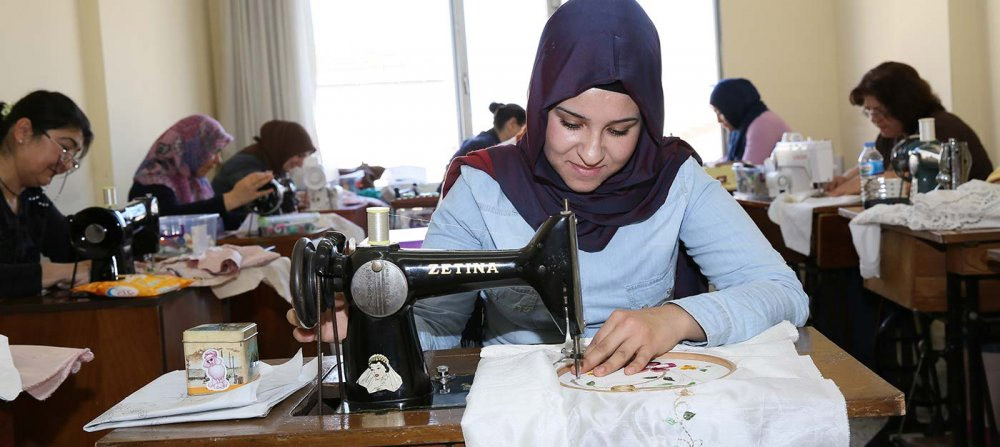
Village – Anwa, District – Jalna, Sate – Maharashtra, Country – India
· Tailoring project will enhance vocational skills & knowledge amongst women & adolescent girls, who will come from economically backward areas & weaker sections of the societies. Additional, it will improve their entrepreneurship & employment skills & empower them taking decision about themselves & make them self-reliant.
· This project will be implemented by the Jamia and supervised by a professional project team constituted for the implementation, management & monitoring of the project.
· Jamia will conduct a Base line survey to analyse the current situation of village as per proposal and identify the potential & interested women for tailoring classes.
· Jamia will establish Vocational centre for tailoring training as per proposed budget.
· Project will train 60 women & adolescent girls during the project year. It will make 4 batches & each batch will consist of 15 women &one batch take 3 month in course completion.
· Training classes will be consisted of theory & practice including social & Islamic education regarding family life.
· Project will develop special learning module on tailoring, entrepreneurship, employment, Current social & family issues & Islamic teachings on it.
· Project will provide certificates& financial support for stitching machines providing opportunities establishing self-business &getting employment in a shop & industry.
· Jamia will maintain regular contact& follow ups with trainees making different in trainees’life & bringing prosperity in their families.
· Jamia will keep a track of funds received for the project implementation and ensure that funds will be utilized properly as stated in the proposed budget.
Educating, Empowering & Enhancing Vocational skills of 60 women from economically backward families through tailoring & life skills training classes.
In rural India, unemployment & underemployment is very high especially amongst women & adolescent girls. People do not think necessary providing opportunities to the women & adolescent girls for modern education & vocational skills due to their poverty, tradition & current trend in the society like just boys. They think also that women & girls are only for cooking food, home chores & giving baby child, because of this, women & adolescent girls are forced to live dependent, deprived, bias, voiceless, marginalized life and relegated to the status of subjugated class.
Jamia through this project will strive to make them self-reliant, restore their dignity and empower them through moral education, vocational skills and opportunities for entrepreneurship & job.it will improve quality of life, role & participation contributing for family system & country as well. The project will provide all the opportunities at their home or nearby home keeping in smooth functioning of family institution.
These factors require the need for Vocational training project in the area where women humiliation, un-Islamic culture, poverty, and the burden of Govt. authorities can be reduced.
· The need& demand for stitching training is very high amongst rural women & adolescent girls.
· Stitching is job oriented skills and also provide self-business opportunity with minimum capital
· Low cost & minimum running cost
· It will meet need of family & generate livelihood opportunities
· Mostly, villages have no Boutique & women tailor while women feel discomfort with male
· Jamia has a module for running tailoring unit (tailoring, education, Islamic family system, life skills &livelihood)
· The venue of centre will be at village or nearby village and women can easily reached at venue
· The master tailor will be female and women not feel hesitation with her.
· Jamia has experienced project management team
· Jamia has implemented such type projects successfully in past years
· Inadequate funds for establishing tailoring unit
· Experienced lady master tailor for village center
· Low literacy rate amongst rural women
· Monitoring of project from head office
· The project will eradicate poverty amongst trainees
· 60 Poor & Needy women directly &360 people indirectly will be benefited through this project& awareness sessionson social & Islamic topics
· The project will support Govt. in providing skills to promote Skill India & Making India
· It will ensure earning opportunity for trainees through self-business & job
· Project impacts will be long lasting & skills will be transfer generation to generation
· It will generate awareness also on social issues & Islamic family system.
· It will empower women & make them self-reliant
· Village selection & Need analysis
· Establishment of Tailoring centre
· Formation of women Groups/Batches
· Classes
· Social awareness sessions
· Workshop on entrepreneurship & career development
· End Line Survey
· Certificate & Machines distribution
· Follow up & Monitoring of Project activities
· Documentation & Impact stories collection
· Jamia Islamia Riyazul Uloom, Anwa, Jalna, Maharashtra
· Coordination with Govt. Local authorities &Women empowerment & Livelihood Department
· Coordination with Beneficiaries
· Formation of Project implementation team
· Preparation of Monthly report
· Preparation of Quarterly progress report
©2022 Jamia Islamia Riyazul Uloom Anwa. All Rights Reserved. Designed by Neo Graphique